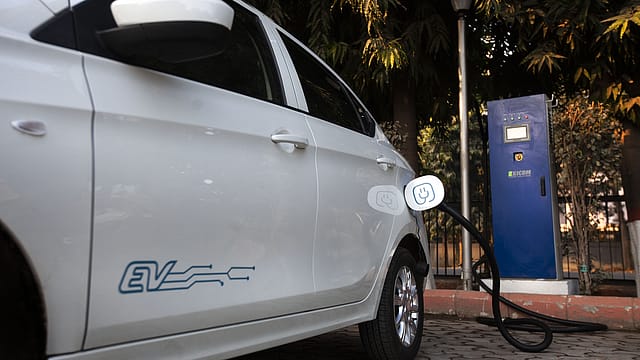Maruti plans 6 EVs by 2030; eyes 15% volumes
ADVERTISEMENT

Japanese automaker Suzuki Motor Corporation (SMC) will introduce six battery electric vehicles (BEVs) in India by FY2030 as it eyes BEVs to make up 15% of its volumes in India by then, the company says in its growth strategy for FY30. In Japan, starting with the introduction of commercial mini-vehicle battery EVs in FY23, it plans to introduce compact SUVs and passenger mini vehicles—with six models to be launched by FY30. In Europe, it will introduce battery EVs in FY24, and expand to SUVs and B-segments—with five models to be launched by FY30. It expects 20% of its volumes in Japan to be driven by BEVs, whereas in Europe, it expects to touch as high as 80% by FY30.
The move is in line with India's goals to become carbon neutral by 2070. The company did its global unveiling of the eVX BEV SUV at the 2023 Auto Expo, which it plans on introducing to the Indian market by FY24. "The Concept eVX is our first global strategic EV. We plan to bring it to market by 2025. There is a revolutionary change happening in the automotive industry to attain carbon neutrality. We want to launch a vehicle which is strong and apt for the Indian market," Toshihiro Suzuki, representative director and president, SMC, had said at the launch.
However, as the company has iterated before, it will not only rely on BEVs to reduce tailpipe emissions. "To provide a full range of products and services, Suzuki will provide not only battery EVs but also carbon neutral internal combustion engine vehicles that use CNG, biogas, and ethanol mixed fuels," the company says. However, SMC has announced plans to invest ₹10,000 crore for manufacturing BEVs and batteries in India. It has a joint venture with Denso Corporation and Toshiba Corporation to manufacture lithium-ion batteries for its hybrid vehicles and for its export portfolio.
SMC, along with its global alliance partner, Toyota Motor Corporation (TMC), believes that one-size-all fits will not work for a market like India. "One of the solutions to tackle carbon neutrality is by introducing BEVs, and other manufacturers in India have launched a BEV before us, but the solution can’t be one. We don’t want to get swayed by BEVs as the only solution. There are various other solutions, like improving the fuel efficiency of gasoline vehicles; introducing hybrid vehicles; vehicles running on alternative fuel, and flex-fuel technology. India is a huge country with a variety of users, and we want to expand in all directions," explained Suzuki.
SMC has also announced its roadmap for biogas in India. "While we expect the Indian market to grow toward FY30, we also expect that an increase in total CO2 emission amount is unavoidable, regardless of the reduction in CO2 emission from products. We will challenge to strike a balance between increasing sales units and reducing total CO2 emission amount," the company explains. It believes that its unique initiative to tackle this challenge is the biogas business—in which biogas derived from cow dung, which are dairy wastes that can be seen mainly in India’s rural areas, will be produced and supplied. "This biogas can be used for Suzuki’s CNG models that account for approximately 70% of the CNG car market in India," it adds.
It should be noted that SMC signed an MoU with the National Dairy Development Board, the Indian government agency, and Banas Dairy, Asia’s largest dairy manufacturer, to conduct verification of biogas. It has also invested in Fujisan Asagiri Biomass, which makes power generation from biogas derived from cow dung in Japan, and is beginning its study. "We believe that the biogas business in India not only contributes to carbon neutrality but also promotes economic growth and contributes to the society of India. We are also in view of expanding the business to other farming areas in regions including Africa, ASEAN, and Japan in the future."
SMC also says that its headquarters, Yokohama Lab., Suzuki R&D Center India, and Maruti Suzuki will cooperate for efficient development by sharing the development in each field of future technologies, advanced technologies, and mass production technologies. Moreover, the Suzuki Innovation Center is exploring new connections and innovations for Suzuki to thoroughly take root in India. "We will enhance our manufacturing strength by also cooperating with outside partners including start-up companies, Suzuki Suppliers Association, and cooperation with universities in Japan and India," it adds.
The company also says that it will deepen its cooperation with TMC. "We will cooperate in the development of advanced technologies—including autonomous and battery of electrified cars, business expansion in promising emerging countries, efforts for carbon neutrality in India," it says. Suzuki had said that it is planning to learn from its alliance partner how to use the BEV technology for building smaller cars. "How to introduce this EV technology on small cars is something we need to work upon and share with Toyota," he had said, adding that SMC is learning future technologies, including BEVs, from TMC and building cars that align with its portfolio.